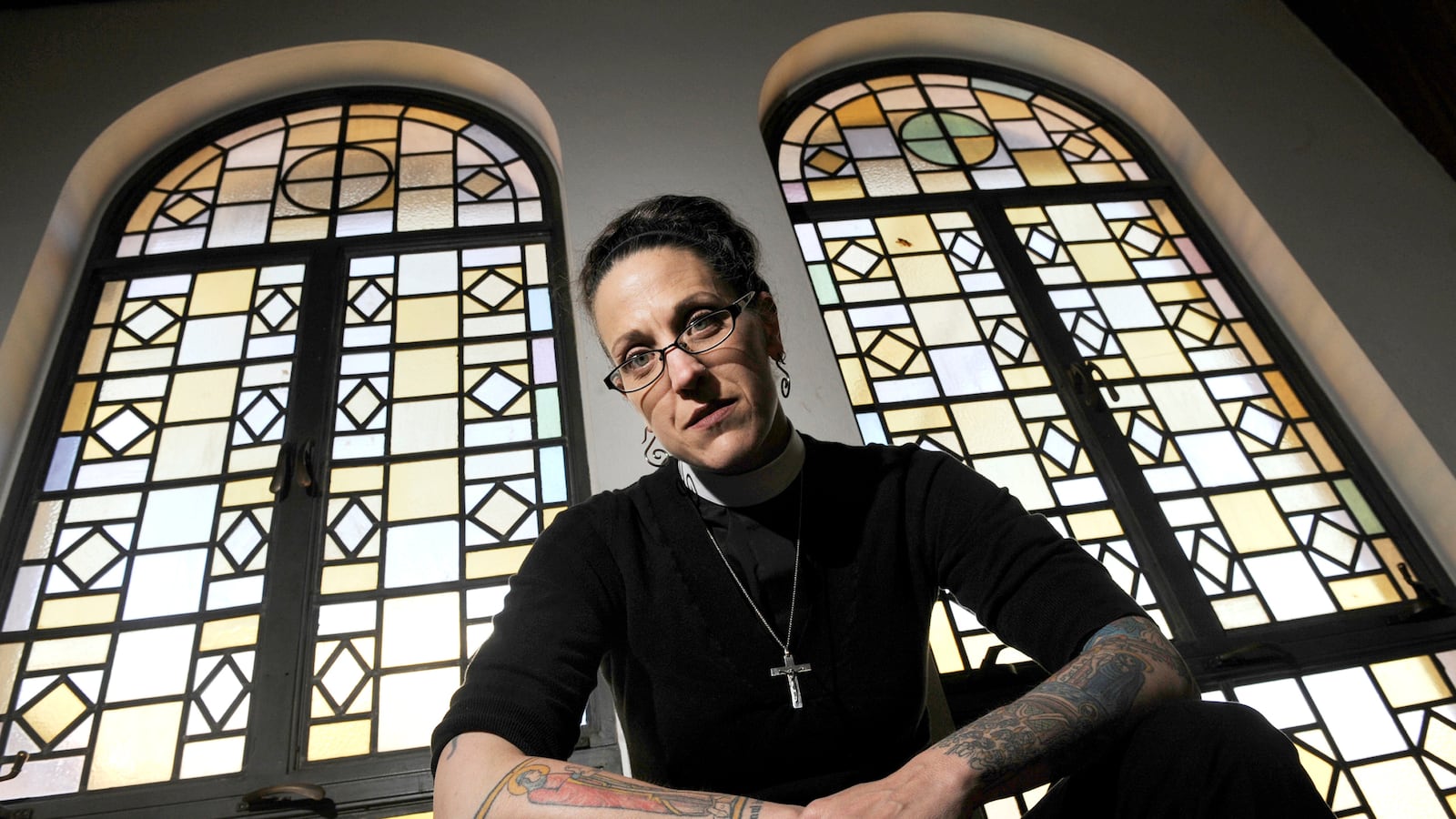Nadia Bolz-Weber is everywhere. A former drug user and alcoholic turned Lutheran minister, she’s gotten attention for her eye-catching appearance—colorful tattoos, cropped hair, hipster glasses—and her reputation for dropping the F-bomb. Her edgy-preacher image landed her a number of mainstream media profiles, and her memoir, Pastrix: The Cranky Beautiful Faith of a Sinner and Saint snuck onto the New York Times Bestseller List.
She’s not the first Christian minister to break into the mainstream media consciousness and become a bestselling author. In fact, evangelical preachers have a knack for igniting media buzz: Rob Bell’s Love Wins made headlines—including in the New York Times—for denying the existence of hell. The frat-boy Calvinist megachurch pastor Mark Driscoll has drawn attention for his brash stage manner and his graphic sex advice. Being a massively successful evangelical star requires as much entrepreneurship as theological depth.
But Bolz-Weber isn't really an evangelical, or if she is, she's a new breed. More important than her gritty look and foul mouth, she’s a female minister who’s unapologetically liberal. Her church, House for All Sinners and Saints in Denver, belongs to a mainline Protestant denomination—the sort that are better known for their highly intellectual liberal theology and aging memberships than their profane bestselling authors. Bolz-Weber is, in many ways, more a part of progressive Christianity than evangelicalism; she’s even written about her frustrations working with evangelicals. But her personality-driven, confessional style might be called the “evangelicalization” of liberal Christianity.
Pastrix tells the story of how Bolz-Weber went from being the rambunctious daughter of conservative Christian parents to all-out rebel punk to Lutheran pastor. She grew up in the Church of Christ, a conservative denomination that forbade women from ministry roles. Women could teach Sunday school, but only to children under 12. That is because 12, in the Church of Christ, is “the age of accountability” when, Bolz-Weber writes, children “spiritually go off [their] parents’ insurance.” At that age, young boys attain a superior standing in the church to adult women, hence women can no longer teach them.
This didn’t go over so well with the young Bolz-Weber, and set her on her journey away from her parents’ church. Her return to faith involved a series of unusual events including living in a commune, a short stint as a stand-up comic, alcoholism and recovery, the death of a fellow comedian, the opportunity to give the eulogy at the memorial service of her friend, and the feeling that God was calling her to minister to these, her people. She attended seminary and founded a church, House for All Sinners and Saints where all manner of outsiders are welcomed with open arms.
Bolz-Weber’s journey, as described in Pastrix, is one that’s increasingly common among former evangelicals: conservatism to rebellion to a more progressive kind of faith. You know the whole story from the very beginning, but each chapter fills in the blanks a bit. The book spirals upward, adding detail at each pass while never letting us forget the basic story of childhood faith, rebellion, and faith once more. Occasionally, the chapters include mini-sermons, but rather than feeling burdensome, these moments are delightful. Bolz-Weber’s sermons include retellings of Bible stories that feature lines such as, “Jesus was like, Dude, you're killing me with this. Knock it off.” Bolz-Weber’s past life as a comedian comes through in the book; her dry sense of humor is apparent on every page.

This is the flip side of Bolz-Weber’s proximity to evangelicalism: one can easily mistake her humor, fashion sense, body art, and vulgar language for a marketable image. Like that cool pastor who occasionally tosses a curse word into his sermon to show you he’s on the level. Often, those very sorts of branding moves result in mainstream media attention and decent book sales. But with Bolz-Weber, it’s not just a marketing stunt. She’s absolutely being herself; it just so happens that her self is pretty marketable. But even she is a bit torn about that: in her Washington Post profile, she laments the way her image is attracting mainstream evangelical attention. She worries that mainstream attention is “[mess]ing up my weird.” Except she didn’t really say “messing.”
And that’s another thing. Bound as her pages are between two covers of a book published by a Christian publisher, albeit a kind of hip one, Bolz-Weber’s profanity-laced prose feels a little forced. There’s a self-consciousness to it that insists, Yes, I know this is a Christian book, but I’m gonna curse like a sailor anyway. Each obscenity feels like it’s tattooed in bright red ink on the page—there so you don’t miss the fact that Bolz-Weber is flouting the rules of Christian stardom.
If you can set aside the vague sense that this is all really savvy self-branding, the amazing thing about Nadia Bolz-Weber is that she manages to take her Christianity into corners of life where the church can be pretty uncomfortable going. Sometimes it’s as if she doesn’t even notice that she’s wading into what some Christians—especially evangelicals—would see as controversial. She tells the story of a “naming ceremony” held at her church in which a formerly-female parishioner, Mary Callahan, became Asher, a male. No big deal. Or the time she participated in an interfaith prayer service on the 10th anniversary of 9/11. As one does. Or the “Quarterly Beer & Hymns” meetings her church holds in a bar. Obviously.
These are the kinds of things mainline Christianity manages to do all the time without much fanfare, often overshadowed by the noisy political and theological controversies of evangelicals. Bolz-Weber uses her personal, colorful evangelical style to draw attention to the unsung grace of progressive Christianity—the love and community that these churches embody amid the confused categories of modern life. Conservative evangelicals love to mock mainline Christianity’s declining numbers and supposed lack of appeal; maybe Nadia Bolz-Weber can prove them wrong.





